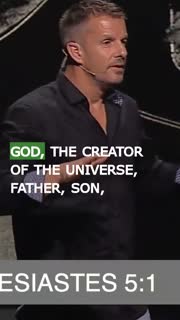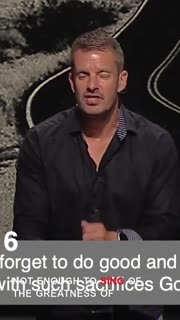Finding Meaning: Faith, Hope, and Awe in Life
Devotional
Sermon Summary
Bible Study Guide
Sermon Clips
1. "We are not a church that prays. We are a house of prayer. And so with that in mind, next week is our first one. And then on October 7th, which is the second one, you've got to mark your calendars and get here early because we're starting at 6.30 on that one, because we're going to be partnering with a bunch of other churches as part of We Pray All Day. And other churches are going to come here, but this is the why. We are going to unashamedly, passionately gather together with other believers across the valley to pray with and pray for the next generation." [02:55] (40 seconds)
2. "Living life under the sun, S-U-N, this is all we've got, is an outside in approach to life. You are chasing, you're chasing outside to help your inside better. But living life under the king in divine order with divine purpose is an inside-out posture. Faith, hope, love is an inside-out posture. I trust God. I believe God. It's not an external influence. It's an internal conviction. Faith, hope, love. And when we live outside in under the sun, it's Hevel. It will always disappoint, always let you down and never be enough. But if we, if we can live from an inside-out, things change." [11:09] (39 seconds)
3. "Therefore, stand in awe of God. The word awesome is from this word awe. I know you say awe, but I can't say awe. It's awe, okay? For today. Stand in awe of God. When was the last time you did that? What even is that? Some translations for verse seven just say, therefore, fear God. Therefore, fear the Lord. True. But when you read that in the Bible, what does that even mean? This is why this is revealing a bit more. Therefore, this is what we do when we come to the house of God. These are the things that matter in your life. Stand in awe of God." [11:47] (49 seconds)
4. "He holds all things together, yet He is beyond our possible understanding. All of creation groans Him. It is majestic and wonderful and inspiring, and yet my fingerprints are all unique and no other person has had them. Every hair on my head, contains my DNA, which nobody else's is the same. Billions of people. Both can cause you to be in awe of God. And we're going to go there today, and I'm going to create space for us to stand in awe. I'm going to give you some tools to do this this week. I'm going to give you some tools to help share it with other people." [12:49] (43 seconds)
5. "God, the creator of the universe, Father, Son, Holy Spirit present here has something to say to you today. Are you listening? No, not me, because I royally messed up this week. He wouldn't want to talk to me. So show me a parent who loves their kids, who says, sorry, you messed up, little boy. Not talking to you anymore. No, a good parent comes, even sees them, and makes a mistake and says, let's help with that. There's some correction, some direction, but there's some love and there's some grace and there's some mercy and there's some strengthening. So no matter what has gone on in your life right now, the king of the universe has something to say to you today. Are you listening?" [14:43] (48 seconds)
6. "When humans experience transcendent awe, synapses fire in our brains, causing us to be measurably, wait for it. So here we go. When we transcendently have awe, our brains respond. Of course they do. Causing us to be measurably more humble, more patient, more connected to others, more kind, more generous. And we also experience, increased critical thinking, better moods, and a decreased sense of materialism. It's like awe in worship literally leads to the fruit of the Spirit in our lives, and it is being scientifically measurable. These qualities therefore help us to live like Jesus. Just by standing in awe of the Lord, it's scientifically measurable, like as if we need that, but it is that they saw this connection, more humble, more patient, more connected to others, more kind, more generous, and people experience greater critical thinking, better moods, and a decreased sense of materialism." [17:08] (84 seconds)
7. "How we respond to the poor, the oppressed, the alien, the foreigner, the immigrant, the widow, the fatherless, how we respond to them is a deeply expression overflow of the heart of God. Jesus said, whatever you did to the least of these, you did unto me. Where does that come from? God established with his people, with the children of Israel, how they were to live with stuff, how they were to live with all that they'd worked for. He established something. Solomon knows this. And yet when we don't, it's Hevel. When we do live according to God's plan, it's blessing. There's a big difference." [20:08] (42 seconds)
8. "It's not enough to sing of the greatness of God. You've got to put it on display. And it's gonna be put on display it comes to the posture towards the oppressed, the poor, the immigrant, the foreigner, the widow, the fatherless, your wealth, your stuff. That's where we put it on display. Now, Solomon, as we know, at that time, the wealthiest man on the planet. And as I said last week, what happened with Solomon, Solomon's wealth, he should never have got that wealthy. God had said how kings should be. Do not acquire that much gold. And of course, his wealth gets corrupted." [21:22] (38 seconds)
9. "So, I've got to work my tail off planting, harvesting, the whole deal and you're telling me that the immigrant can help himself afterwards? That the fatherless can just come and get it without working for it? That the widow can just come and get it without working for it? But I worked it, it's my field. I worked my tail off. I put all the effort in, it's mine. Why should they get it? If they want it, then they should come work for me. They should put the work in if they want it. But God says no. Who made the wheat grow? Who created the olives in the first place? Who causes the grapes to have multiple purposes and make a difference? It's not yours." [25:17] (63 seconds)
10. "The key is your life being rooted in worship. The key is your life being rooted in a standing in awe of God. Hebrews 12, therefore, verse 28, therefore, see, since we are receiving a kingdom that cannot be shaken, let us be thankful and so worship God acceptably with reverence and awe for our God is a consuming fire. That means He's a cleanser, a purifier, and make things all the way they should have been and burns off the rest. Therefore, stand in awe of God." [32:36] (39 seconds)
Ask a question about this sermon
2. "Living life under the sun, S-U-N, this is all we've got, is an outside in approach to life. You are chasing, you're chasing outside to help your inside better. But living life under the king in divine order with divine purpose is an inside-out posture. Faith, hope, love is an inside-out posture. I trust God. I believe God. It's not an external influence. It's an internal conviction. Faith, hope, love. And when we live outside in under the sun, it's Hevel. It will always disappoint, always let you down and never be enough. But if we, if we can live from an inside-out, things change." [11:09] (39 seconds)
3. "Therefore, stand in awe of God. The word awesome is from this word awe. I know you say awe, but I can't say awe. It's awe, okay? For today. Stand in awe of God. When was the last time you did that? What even is that? Some translations for verse seven just say, therefore, fear God. Therefore, fear the Lord. True. But when you read that in the Bible, what does that even mean? This is why this is revealing a bit more. Therefore, this is what we do when we come to the house of God. These are the things that matter in your life. Stand in awe of God." [11:47] (49 seconds)
4. "He holds all things together, yet He is beyond our possible understanding. All of creation groans Him. It is majestic and wonderful and inspiring, and yet my fingerprints are all unique and no other person has had them. Every hair on my head, contains my DNA, which nobody else's is the same. Billions of people. Both can cause you to be in awe of God. And we're going to go there today, and I'm going to create space for us to stand in awe. I'm going to give you some tools to do this this week. I'm going to give you some tools to help share it with other people." [12:49] (43 seconds)
5. "God, the creator of the universe, Father, Son, Holy Spirit present here has something to say to you today. Are you listening? No, not me, because I royally messed up this week. He wouldn't want to talk to me. So show me a parent who loves their kids, who says, sorry, you messed up, little boy. Not talking to you anymore. No, a good parent comes, even sees them, and makes a mistake and says, let's help with that. There's some correction, some direction, but there's some love and there's some grace and there's some mercy and there's some strengthening. So no matter what has gone on in your life right now, the king of the universe has something to say to you today. Are you listening?" [14:43] (48 seconds)
6. "When humans experience transcendent awe, synapses fire in our brains, causing us to be measurably, wait for it. So here we go. When we transcendently have awe, our brains respond. Of course they do. Causing us to be measurably more humble, more patient, more connected to others, more kind, more generous. And we also experience, increased critical thinking, better moods, and a decreased sense of materialism. It's like awe in worship literally leads to the fruit of the Spirit in our lives, and it is being scientifically measurable. These qualities therefore help us to live like Jesus. Just by standing in awe of the Lord, it's scientifically measurable, like as if we need that, but it is that they saw this connection, more humble, more patient, more connected to others, more kind, more generous, and people experience greater critical thinking, better moods, and a decreased sense of materialism." [17:08] (84 seconds)
7. "How we respond to the poor, the oppressed, the alien, the foreigner, the immigrant, the widow, the fatherless, how we respond to them is a deeply expression overflow of the heart of God. Jesus said, whatever you did to the least of these, you did unto me. Where does that come from? God established with his people, with the children of Israel, how they were to live with stuff, how they were to live with all that they'd worked for. He established something. Solomon knows this. And yet when we don't, it's Hevel. When we do live according to God's plan, it's blessing. There's a big difference." [20:08] (42 seconds)
8. "It's not enough to sing of the greatness of God. You've got to put it on display. And it's gonna be put on display it comes to the posture towards the oppressed, the poor, the immigrant, the foreigner, the widow, the fatherless, your wealth, your stuff. That's where we put it on display. Now, Solomon, as we know, at that time, the wealthiest man on the planet. And as I said last week, what happened with Solomon, Solomon's wealth, he should never have got that wealthy. God had said how kings should be. Do not acquire that much gold. And of course, his wealth gets corrupted." [21:22] (38 seconds)
9. "So, I've got to work my tail off planting, harvesting, the whole deal and you're telling me that the immigrant can help himself afterwards? That the fatherless can just come and get it without working for it? That the widow can just come and get it without working for it? But I worked it, it's my field. I worked my tail off. I put all the effort in, it's mine. Why should they get it? If they want it, then they should come work for me. They should put the work in if they want it. But God says no. Who made the wheat grow? Who created the olives in the first place? Who causes the grapes to have multiple purposes and make a difference? It's not yours." [25:17] (63 seconds)
10. "The key is your life being rooted in worship. The key is your life being rooted in a standing in awe of God. Hebrews 12, therefore, verse 28, therefore, see, since we are receiving a kingdom that cannot be shaken, let us be thankful and so worship God acceptably with reverence and awe for our God is a consuming fire. That means He's a cleanser, a purifier, and make things all the way they should have been and burns off the rest. Therefore, stand in awe of God." [32:36] (39 seconds)










